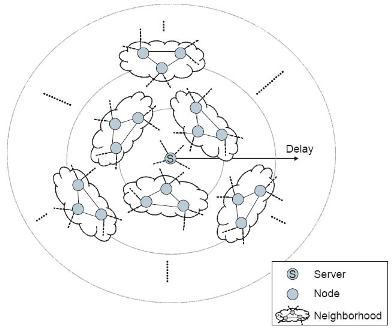We consider streaming video content over an overlay network of peer nodes. We propose a novel algorithm for constructing the distribution overlay, where peers are arranged in neighbourhoods that exhibit similar latency values from the origin media server. Such an organization increases data sharing between neighbours in broadcast applications and reduces the play-out latency at a peer. The nodes are equipped further with a novel streaming strategy that is built on utility-based packet scheduling and proportional resource sharing in order to fight against free-riders. Each of the peers employs a mesh-pull mechanism to organize the download of media packets from its neighbours. For efficient resource utilization, data units are requested from neighbours based on their utility. The packet utility is driven by both its importance for the video reconstruction quality at the receiving peer and its popularity within the peer neighbourhood. In order to discourage free-riding in the system, requesting peers then share the upload bandwidth of a sending peer in proportion to their transmission rate to that peer. Our simulation results show that the proposed protocols increase the performance of a mesh-pull P2P streaming system. Significant improvements are registered relative to existing solutions in terms of average quality and average decoding rate. The proposed mesh construction procedure provides further gains in performance in terms of frame-freeze and playback latency relative to a conventional approach where peer neighbours are selected at random. Corresponding gains in video quality for the media presentation are also registered due to the improved continuity of the playback experience.

Figure 1. An illustration of the proposed latency-based mesh construction.